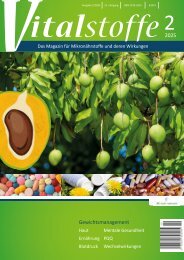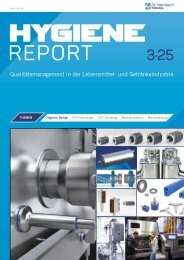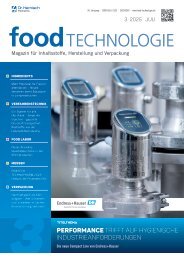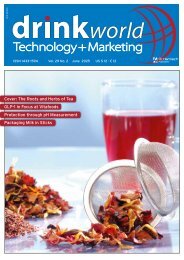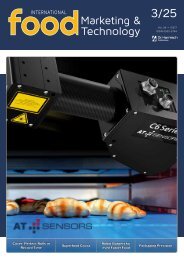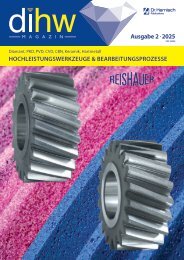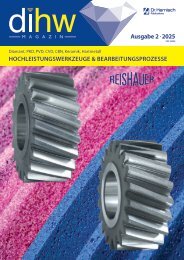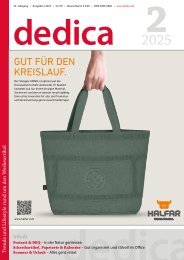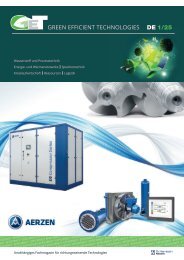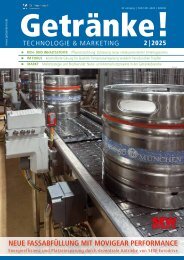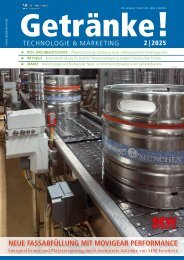PetFood PRO 4/2024
PetFood PRO is the international magazine for executives and specialists in the manufacture of food for domestic animals – the pet food industry. The magazine focuses on food and delicacies for dogs, cats and other small animals, ornamental birds and fish, as well as animals kept in terrariums. We publish feature articles, reports and announcements about new ingredients, technology, equipment and processes, packaging machinery and materials as well as marketing trends and developments. Readers are executives, product developers and specialists in the pet food industry, including process and packaging engineers. PetFood PRO will be published in English. Circulation is worldwide, with an emphasis on important growth markets.
PetFood PRO is the international magazine for executives and specialists in the manufacture of food for domestic animals – the pet food industry. The magazine focuses on food and delicacies for dogs, cats and other small animals, ornamental birds and fish, as well as animals kept in terrariums.
We publish feature articles, reports and announcements about new ingredients, technology, equipment and processes, packaging machinery and materials as well as marketing trends and developments. Readers are executives, product developers and specialists in the pet food industry, including process and packaging engineers. PetFood PRO will be published in English. Circulation is worldwide, with an emphasis on important growth markets.
Transform your PDFs into Flipbooks and boost your revenue!
Leverage SEO-optimized Flipbooks, powerful backlinks, and multimedia content to professionally showcase your products and significantly increase your reach.
INGREDIENTS
Probiotic and Postbiotic
Supplements for Positive Gut
Health in Adult Dogs
ADM a global leader in innovative
solutions from nature, announces the
publication of its first-in-species study
of Bifidobacterium animalis subsp.
lactis CECT 8145 (BPL1) 1 on adult dogs
by the Journal of Animal Science. This
pioneering study examined the effects
of daily supplementation of both the live
probiotic and heat-treated postbiotic
forms of BPL1 on canine health.
According to recent ADM global
consumer research, 55% of U.S. pet
Supp. Table 5. Relative fold change in leukocyte
gene expression of dogs in the three treatment
groups.
Supp. Table 5. Relative fold change in leukocyte gene expression of dogs in the three treatment groups.
Treatment
Item CON PRO POST SEM 1 P-Value
PPARGC1 2 0.7 0.7 0.6 0.11 0.7026
SREBF-1 2 0.6 0.5 0.6 0.12 0.4874
IGF1 2 0.9 0.8 0.8 0.14 0.2018
Leptin 0.6 b 0.8 a 0.5 b 0.13 0.0095
UCP 2 0.9 0.8 0.6 0.12 0.1484
HSL 2 1.4 1.5 1.2 0.31 0.8276
ADIPOR1 2 1.5 1.4 1.1 0.28 0.2735
Resistin 0.9 0.9 0.8 0.10 0.2103
SOD 2 1.1 1.1 0.9 0.15 0.3239
Catalase 2 1.0 0.9 0.8 0.10 0.1035
MTOR 2 0.9 0.9 0.8 0.14 0.2769
TLR4 2,5 0.7 y 0.9 x 0.8 xy 0.08 0.0746
Supp. Table 5 (cont.). Relative fold change in leukocyte gene
expression of dogs in the three treatment groups.
Supp. Table 5 (cont.). Relative fold change in leukocyte gene expression of dogs in the three treatment groups.
Treatment
Item CON PRO POST SEM 1 P-Value
IL61 2 0.6 0.5 0.5 0.10 0.3110
GSR 2 1.0 0.9 0.7 0.14 0.2730
COX2 2 0.7 0.7 0.5 0.12 0.1934
MMP3 2 0.7 0.6 0.7 0.14 0.7516
RSP6KA5 2 0.6 0.7 0.6 0.11 0.3699
HSP1 2,6 0.9 b 1.3 a 0.8 b 0.16 0.0037
IRS1 2 1.0 1.1 0.9 0.20 0.8247
IRS2 2 0.7 0.5 0.6 0.11 0.3122
LPL 2 1.1 1.4 0.8 0.20 0.1012
CPT1A 2 0.8 a 0.7 ab 0.5 b 0.11 0.0216
PPARG 2 0.7 0.6 0.7 0.16 0.3400
Adiponectin 0.6 0.6 0.6 0.10 0.6244
owners have purchased biotics at least
once a year because of a professional
recommendation. In many cases,
they use biotics to support their pet’s
digestive or gastrointestinal concerns 2 .
“The popularity of functional ingredients
has increased as pet owners seek ways
to improve the health and wellness of
their pets, yet limited research has been
conducted regarding the use of probiotics
and postbiotics and their effects on
canine health,” said Sophie Nixon, Ph.D.,
Head of Clinical Research for Pet & Animal
Well-being at ADM, who oversaw the trial.
For this exploratory
study, 18 adult beagles
and 18 adult English
pointers were used in
a 3-arm randomized,
placebo-controlled, parallel
group design, with
12 animals per group.
Following a 60-day
adaptation period in
which dogs were fed
a standard diet alone,
the dogs were then
supplemented with
either probiotic or
postbiotic BPL1 or
an identical placebo
alongside their
standard diet for 90
days. Measurements
were taken to assess
outcome measures
relating to a variety of
health areas, including
fecal fermentative
end products and
microbiome, insulin
sensitivity, serum gut
hormones, oxidative
stress, inflammatory
biomarkers and
white blood cell gene
expression.
Improvements were observed in fecal
short-chain fatty acids, as well as
changes in microbiome composition
and the functional metagenome, when
compared to placebo control. Data from
the trial shows that both the live and
heat-treated forms of BPL1 can safely be
supplemented in healthy adult dogs and
support several aspects of gut health. A
further clinical study is ongoing to assess
additional physiological outcomes, with
a focus on metabolic health.
“Groundbreaking science such as this
canine trial spurs development of
ADM’s functional ingredients across
human, pet and animal nutrition,” said
Mark Lotsch, ADM’s President of Global
Health & Wellness. “Beneficial outcomes
and ingredient stability of our awardwinning
BPL1 solution have been
repeatedly demonstrated in previous
human clinical trials. We are thrilled to
also see promising results for pet health
applications.”
Because heat-treated BPL1 has a
similar effect to live BPL1 in healthy
adult dogs, pet product formulators
will have greater flexibility through the
manufacturing and supply process, as
they don’t need to make adaptations for
living microorganisms 3 . Notably, extreme
heat from extrusion and baking common
in pet food processing can diminish the
efficacy of live probiotics. As inanimate
microorganisms, postbiotics can confer a
health benefit on the host despite these
challenging conditions.
Technology & Marketing
Photos: ADM
14
Technology & Marketing




